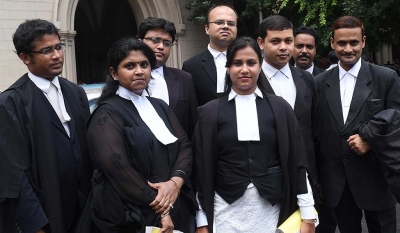
I have recently finished my board exams. I aspire to become a lawyer. I want to shape my career right away. What subjects one opt to become eligible? Apart from institution-based studies what other types of studies and coaching do I need to take up? Please give me a list of institutions, particularly those in Kolkata. How do I prepare for the various competitive exams? Please explain the entrance procedure. How else do I realise my aim?
The admission procedure to the National Law School league – the National Law School of India University (NLSIU), Bangalore; National Academy of Legal Studies and Research (NALSAR), Hyderabad; National University of Juridical Sciences (NUJS), Kolkata; National Law University (NLU), Jodhpur; and National Law Institute University (‘NLIU’) in Bhopal is already underway. The last date for forms is over. In fact, by the time, you receive this magazine these institutes would have conducted the entrance exam. You have not mentioned whether you have appeared for your class X or class XII exam. If you have just appeared for your class X board exam, the reply will be relevant for you.
The entrance exams are usually of around two hours’ duration and contain both objective and subjective type questions. The subjects tested are: English, analytical reasoning (Logic), legal reasoning, general knowledge (including legal awareness) and mathematics.
None of the sections in the papers are usually tough, keeping on mind the standard of the board exams in India. More than the toughness of the question it is time pressure and the number of applicants that make the selection procedure tough. The English section tests students on vocabulary, reading comprehension, structuring of sentences among other things; the analytical reasoning section tests students on identifying weak and strong arguments, syllogisms, relationships, sequencing etc; the legal reasoning section tests students on their ability to correctly apply a principle to a given set of facts and decide whether something is correct or incorrect; the general knowledge section tests students on their general awareness of basic laws and legal developments; and the mathematics section tests students mainly in basic commercial maths.
General knowledge and English vocabulary are two areas that require long term preparation. Make sure to read a good newspaper daily – not at the end of the week or once in a while. Keep an eye out for news relating to law or international affairs in some way or the others. Take it one step further by maintain a scrap book of relevant cutting from the papers. Pick up a weekly magazine to boost your knowledge. Do it regularly. Build it in your routine. Similarly, pick up new words and phrases from newspapers and magazines, not just for making a word list of your own. Use them in your day-to-day conversation. These are practices you will be thankful for when you sit for the exam.
It should be noted that these are areas where one has to rely upon oneself. You can’t expect a tutor to tell you ‘OK! Today we will do facts about the Olympic Games’ or ‘Today we will do the word iconoclast!
As regards the other areas mentioned above, these can be covered through an exhaustive preparation a month or two before exams. It will help you to take help of an experienced tutor for these areas.
Picture Credit : Google


